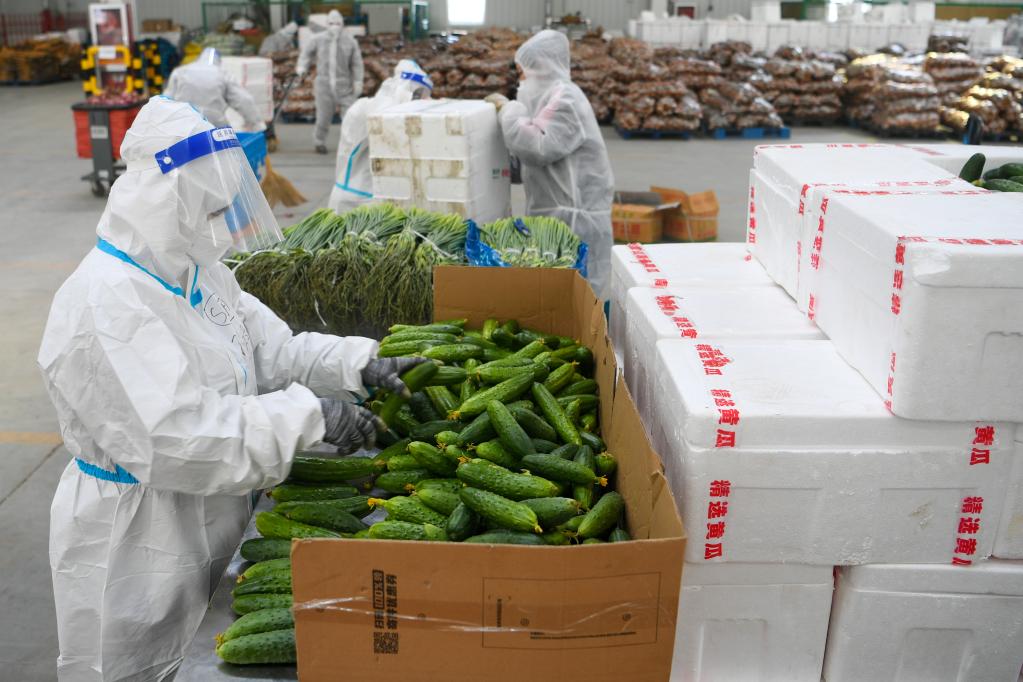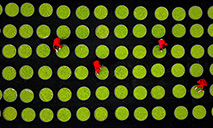Demand for vegetables met amid restrictions

Staff members sort out vegetables at a logistics center in Changchun, Jilin province, March 27, 2022. [Photo/Xinhua]
Residents in Changchun, the capital of Jilin province, have been busy getting fresh vegetables by any means during the recent battle against COVID-19, including purchasing government vegetable packages, ordering via online platforms and even growing their own.
"Due to tightened control and prevention measures starting on March 20, residents in Changchun have faced limits on movement and difficulty in purchasing," Liu Renyuan, deputy secretary-general of the Changchun government, said at a news conference on Tuesday.
"Moreover, the city's two major wholesale vegetable markets have been temporarily closed because of the epidemic, adding another challenge to getting fresh vegetables."
"We express our deep apology for bringing so much impact and inconvenience to all residents because of our imperfect work," he added.
To solve the problem promptly, the province has coordinated with cities in the province, such as Siping, Liaoyuan and Tonghua, as well as with other provinces, including Hebei and Shandong, to transport fresh vegetables to Changchun.
"With their great support, the first shipment of 500 metric tons of fresh vegetables arrived on Saturday, and the amount increased to 1,003 tons starting on Monday," Liu said. "Together with the local supply, the daily supply capacity can reach 1,600 tons and meet local demand.
"Mixed vegetables have been packed before loading, which greatly reduced the workload in Changchun, which is facing a serious labor shortage," he said.
Chen Xi, a resident in Erdao district of Changchun, received a 6-kilogram package of vegetables on Tuesday.
"On Sunday, a community worker posted a message in the WeChat group that we could order the vegetable package," she said. "I spent 80 yuan ($12.60) purchasing a package, which contained around 10 kinds of vegetables. They were fresh when they arrived."
Liu Wanjin, 48, who lives in Lyuyuan district, was a bit anxious about his family's supply.
"I didn't get the order information until Wednesday morning," he said. "In recent days, I failed to purchase any vegetables after my orders via online platforms were returned."
"I hope I can get the vegetable package soon, but community workers didn't tell us when," he added.
Liu Lixiang, a 52-year-old resident in Jingyue district, has produced bean sprouts at home and shared them with her neighbors.
"All residential communities and villages in Changchun were under lockdown starting on March 11, and we were asked not to leave home unless necessary," she said. "To kill time, I managed to produce some bean sprouts and plant some vegetables, such as green onion and Chinese cabbage, in the flowerpot."
"I was quite happy when I received praise from my neighbors after I sent some bean sprouts to them," she said. "We should keep a good state of mind during the epidemic."
Of the 1,150 new locally transmitted COVID-19 cases that Jilin province reported on Tuesday, 875 were in Changchun, 268 in Jilin city and seven in Siping. Of the 1,032 newly reported asymptomatic carriers in Jilin province, 680 were in Jilin city, 348 in Changchun, two in Siping, and one each in Liaoyuan and Baicheng, according to local health authorities.
Spring plowing
Despite the resurgence of cases, government departments are making efforts to ensure the smooth progress of spring plowing, officials said at a news conference on Wednesday.
"As of Tuesday, over 88 percent of funds for spring plowing production had been raised, and 87.3 percent of seeds, 68.8 percent of fertilizers and 33.6 percent of pesticides had been sent to farmers," said Liu Wenguo, deputy director of the provincial department of agriculture and rural affairs.
The department also launched online training courses to help answer farmers' questions about agricultural policies, information and technology.
Nie Jiguo, 48, a farmer in Loushang village in Shulan, a county-level city under the administration of Jilin city, purchased agricultural materials in Fate, a town around 7 kilometers away.
"Starting on Wednesday, villagers are allowed to go out to purchase agricultural materials," he said. "I planned to plant rice on my 7 hectares of farmland and had prepared the seeds before the recent epidemic outbreak."
"Due to the seasonal rhythm, we have to start cultivating seedlings on April 7 and plow the land starting on April 20," he said. "The best period for planting rice seedlings in our region is the second half of May."
"I hope we can return to normal life as soon as possible," he added.
Photos
Related Stories
- Shanghai’s unique status requires zero-COVID approach with minimum cost
- COVID-19 antigen test kits sold at Beijing's pharmacies
- Shanghai registers highest daily tally of asymptomatic cases in Chinese mainland
- China issues more targeted testing guideline under dynamic zero policy, no longer requires mass testing
- Shenzhen restarts production, public transportation
Copyright © 2022 People's Daily Online. All Rights Reserved.










